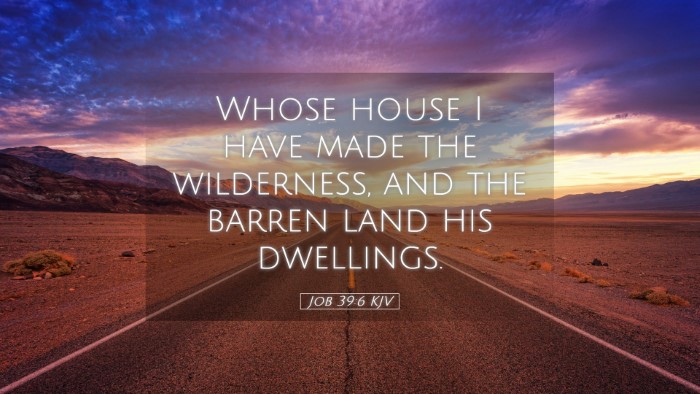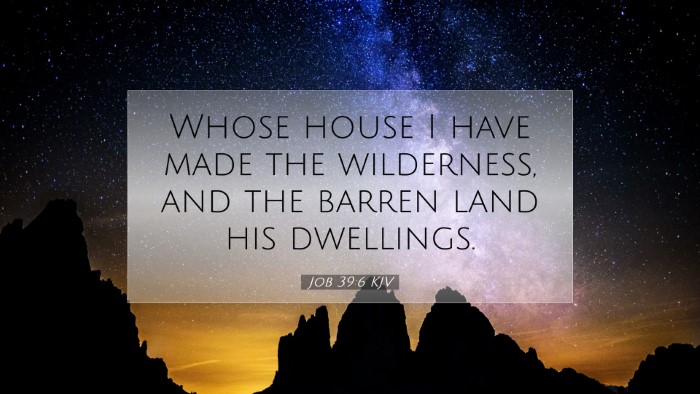Old Testament
Genesis Exodus Leviticus Numbers Deuteronomy Joshua Judges Ruth 1 Samuel 2 Samuel 1 Kings 2 Kings 1 Chronicles 2 Chronicles Ezra Nehemiah Esther Job Psalms Proverbs Ecclesiastes Song of Solomon Isaiah Jeremiah Lamentations Ezekiel Daniel Hosea Joel Amos Obadiah Jonah Micah Nahum Habakkuk Zephaniah Haggai Zechariah MalachiJob 39:6
Job 39:6 KJV
Whose house I have made the wilderness, and the barren land his dwellings.
Job 39:6 Bible Commentary
Commentary on Job 39:6
Verse Context: Job 39:6 reads, "Whose house I have made the wilderness, and the barren land his dwellings." This verse is situated within a larger discourse where God is addressing Job, emphasizing His sovereignty over creation and the natural order of the world.
Introduction
Job 39 marks a pivotal moment in God's response to Job, highlighting the majesty of the Creator and the bewildering intricacy of His design. As God moves to illustrate His power through various creatures, "the house of the wilderness" becomes a metaphor for divine order, illustrating a point that serves both to humble Job and to reveal the glory of God's creation.
Insights from Public Domain Commentaries
Understanding the Wilderness
Matthew Henry: Henry emphasizes that the wilderness speaks of desolation yet is a deliberate place created by God for certain creatures. The wild beasts, while seemingly abandoned by humanity, find their sustenance in the wilderness, thus reflecting on how God's provision is pervasive. God manifests His providence, ensuring that each creature has a designated place in His creation, no matter how inhospitable it appears to humans.
The Purpose of Creation
Albert Barnes: Barnes expands on the concept of God establishing a 'house' for the wild creatures. This indicates that every aspect of creation serves a distinct purpose. The wilderness, although lacking human cultivation, is precisely where these animals thrive, revealing God's wisdom. He reminds us that the apparent desolation is part of a greater design where all living beings fulfill their roles and are sustained by God’s ongoing creative work.
God's Sovereignty Illustrated
Adam Clarke: Clarke points out that the imagery of the wilderness serves to highlight the contrast between human assumptions and divine reality. While people often perceive desolate areas as void of God's attention, Clarke notes that such places serve divine purposes. God's sovereignty extends even into the barren lands where He provides for the needs of His creatures. Clarke views this verse as an invitation to appreciate the complexity and orderliness inherent within creation that defies human understanding.
Theological Implications
The implications of Job 39:6 resonate profoundly in theological discussions regarding creation, God’s providence, and the nature of His involvement with the world. The wilderness serves as a theological symbol pointing towards the paradox of God's presence in chaos. Just as God assigns a habitat to the animals in desolation, He presides over human desolation, ensuring that His will is accomplished in every aspect of life.
1. Divine Providence
- God's provision spans across the wilderness, demonstrating His care for all creatures.
- This care also extends to humanity, despite appearances to the contrary in times of suffering.
2. Understanding Suffering
- Job’s narrative raises questions of theodicy, especially when juxtaposed with divine wisdom reflected in creation.
- The text suggests that what seems desolate may still be under God’s sovereign and purposeful care.
3. The Nature of God
- Job 39:6 invites us to contemplate the expansive nature of God who orchestrates the universe.
- It challenges believers to trust in God's overarching plan, even amidst personal wilderness experiences.
Application for Today
Job 39:6 is as relevant today as it was in ancient times. Believers are reminded that even in moments of desolation, God is at work. This verse serves as a source of comfort for those experiencing barren phases in their lives, encouraging them that they are not forgotten and that God's designs often exceed our comprehension.
Encouragement for Pastors and Theologians
In ministry, the text reminds leaders to provide care and guidance to those in seemingly barren places. Using Job 39:6, pastors can draw on God's faithful presence to articulate hope amidst despair, illustrating that God's plans are often at work even when His actions seem hidden. The understanding that God has created and sustains all, including the difficult circumstances we encounter, offers profound insights into pastoral care and teaching.
Reflection for Students and Scholars
For students and scholars, the commentary on Job 39:6 opens discussions about the nature of God’s relationship with creation and what it means to trust in divine providence. The theological depth invites rigorous examination of suffering and provision in biblical texts, resulting in enriched understanding and practice. In embracing the wilderness theme, scholars can explore how the desolate becomes a tool of teaching about reliance on God, even when one feels estranged.
Conclusion
Job 39:6 serves as a poignant reminder of God's sovereignty and the intricate, purposeful order He has established within creation. The theme of wilderness challenges believers to acknowledge God’s hand in every aspect of life, including amid desolation and apparent abandonment. As we reflect on this profound verse, may we find comfort in the knowledge that God sees, sustains, and cares for all of His creations, even in the harshest wilderness.


